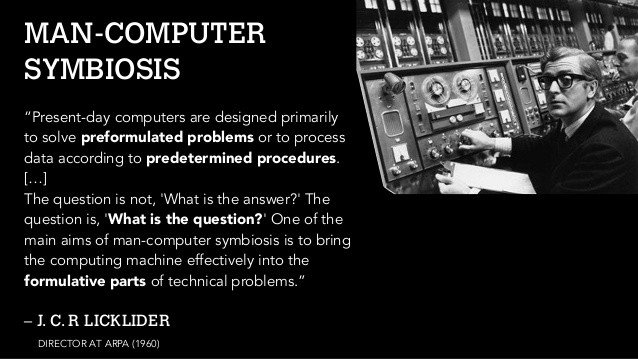A crux on the intelligence revolution (Man +
A crux from Issacson's book the "the Innovators" as he nails possibilities ahead.
These latest advances may even lead to the “Singularity” a term that von Neumann coined and the futurist Ray Kurzweil and the science fiction writer Vernor Vinge popularized, which is sometimes used to describe the moment when computers are not only smarter than humans but also can design themselves to be even supersmarter, and will thus no longer need us mortals.
Isaacon illustrates that “We can leave the debate to the futurists. Indeed depending on your definition of consciousness, it may never happen. We can leave “that” debate to the philosophers and theologians. “Human ingenuity” wrote Leonardo da Vinci “will never devise any inventions more beautiful, nor more simple, nor more to the purpose than Nature does”.

Computers as a Complement to Humans
“There is however another possibility, one that Ada Lovelace would like. Machines would not replace humans but would instead become their partners. What humans would bring is originality and creativity”.
Let us assume, for example, that a machine someday exhibits all of the mental capabilitie of a human: giving the outward appearance of recognizing patterns, perceiving emotions, appreciating beauty, creating art, having desires, forming moral values, and pursuing goals. Such a machine might be able to pass a Turing test.
It might even pass we could call the Ada test, which is that it could appear to “originate” its own thoughts that go beyond what we humans program it to do. There would, however, be still another hurdle before we could say that artificial intelligence has triumphed over augmented intelligence. We call it the Licklider Test. It would go beyong asking whether a machine could replicate all the components of human intelligence to ask whether the machine accomplishes these tasks better when whirring away completely on its own or when working in conjunction with humans.
In other words, is it possible that humans and machines working in partnership will be indefinitely more powerful than an artificial intelligence machine working alone? If so, then “man-computer symbiosis,” as Licklider called it, will remain triumphant. Artificial Intelligence need not be the holy grail of computing. The goal instead could be to find ways to olptimize the collaboration between human and machine capabilities – to forge a èartnership in which we let the machines do what they do best, and they let us do what we do best.